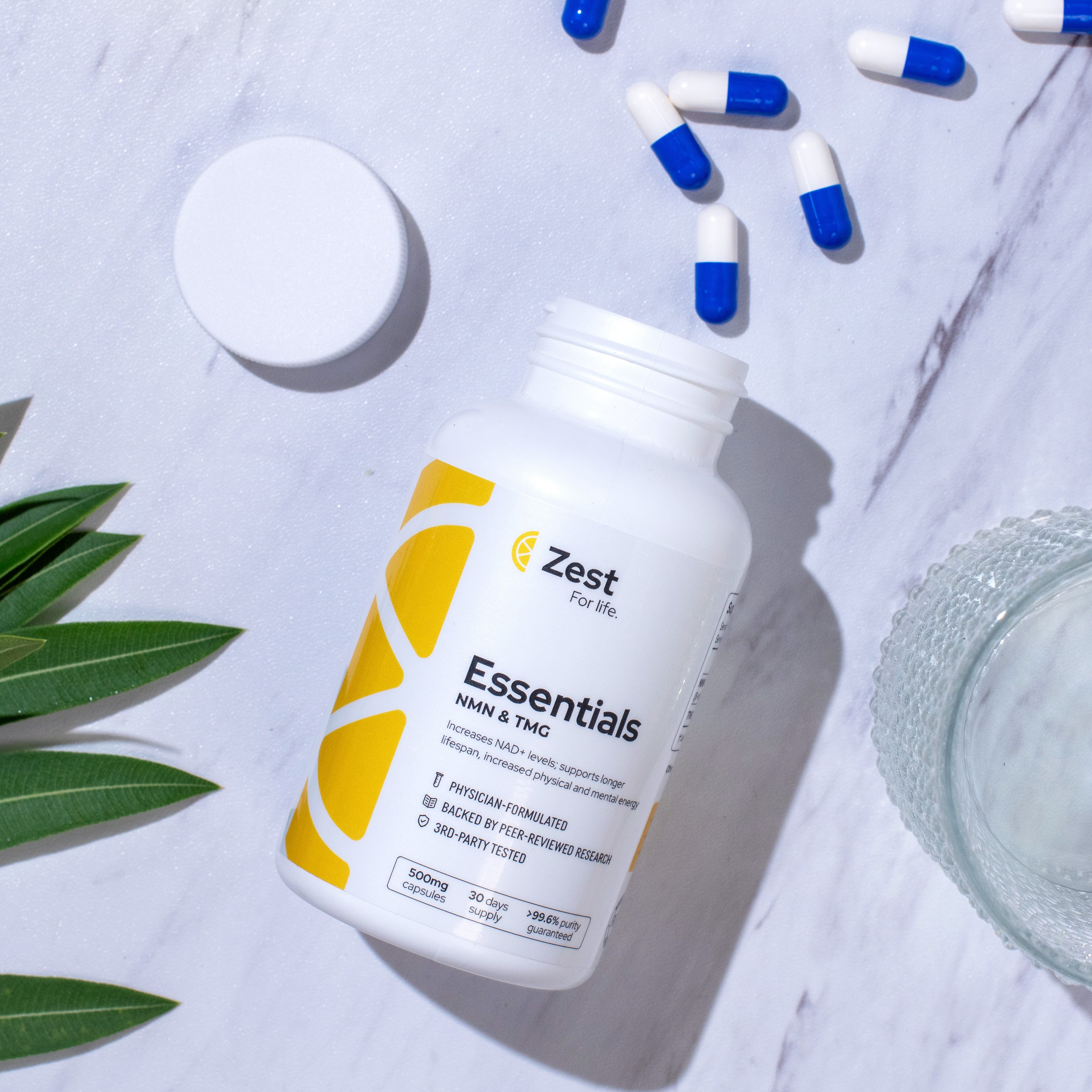The problem with Huberman, AG1 and multivitamins

Many in the longevity world were shocked by the recent revelations about Andrew Huberman in New York Magazine. Although the article focused on Huberman’s private life, it also raised questions about the validity of his scientific credentials and the value of some of his recommendations, particularly the nutritional supplement powder AG1.
This got us thinking about AG1 and the broader subject of multivitamins in general. In this blog, we’ll discuss why multivitamins like AG1 aren’t worth your money and how a balanced diet and more targeted supplements offers a better alternative.
Why AG1 is unlikely to give you everything you need
AG1 (formerly known as Athletic Greens) is a green powder that, according to Huberman’s endorsement, “covers all of your foundational nutritional needs” in one daily dose, while also boosting energy levels and contributing to a better gut microbiome and immune system. Its manufacturer’s state that AG1 contains 75 ingredients, including vitamins, minerals, pre- and probiotics, and numerous fruit, vegetable and plant extracts, but they don’t reveal how much of each is present, which is a major red flag. Given that such a huge variety of compounds are included, most of them will only be present in tiny amounts that are well below the effective dose.
Green tea extract, for example, appears to have some benefits when taken at doses around 1g/day, [1] but it is included near the end of AG1’s ingredient list, suggesting that there is far less than 1g present in the 12g daily serving of AG1. Similarly, AG1 contains a range of antioxidants and polyphenols, which have long been associated with healthier ageing. These are found throughout the natural world, but you generally have to eat a very large portion of fruit or vegetables to reach a therapeutic dose, so the amount present in the extracts that make up AG1 are unlikely to have much of an effect.
There’s also the issue of whether AG1’s ingredients are even absorbed by your body at all and able to exert a positive effect. The company has published research papers that show how, in a “simulated stomach and intestine,” more vitamins and minerals are absorbed from AG1 than from a standard multivitamin. [2] However, this doesn’t prove that the compounds are absorbed in an actual stomach, and there’s currently not enough evidence to suggest that micronutrients are taken up as effectively from powdered extracts as they are from whole fruit and vegetables.
Why multivitamins probably aren’t worth your money
In many ways, AG1 can be seen as just another example of a multivitamin. It’s estimated that over 50% of Americans take a multivitamin of some kind. [3] As with AG1, the biggest problem with multivitamins is they don’t contain enough of any specific ingredient to counteract any deficiencies you may have, while also typically having poor absorption.
Despite extensive research over the last few decades, long-term studies have failed to consistently show that multivitamins can benefit health or extend lifespan. The longest study so far followed male physicians for around 25 years and found that, although those who took multivitamins had a slightly decreased risk of developing cancer compared to those who took a placebo, there were no effects on cardiovascular disease or overall mortality. [4, 5] Another similar randomised controlled trial found that taking a multivitamin did not benefit cognitive health [6] and a large study that followed around 180,000 people of various ethnicities for an average of 11 years found that taking multivitamins had no effect on cancer rates, cardiovascular disease or mortality. [7]
A balanced diet and targeted supplements are optimal
Ultimately, there are two good reasons to take a supplement: 1) you have a known deficiency in that ingredient, or 2) it is an ingredient which you cannot get through your regular diet. Almost all the ingredients that multivitamins contain can be obtained through your diet and are much better absorbed that way, as they are in their natural form which your body has evolved to digest. Dietary sources of nutrients also contain fiber, whole grains and other health-enhancing, naturally occurring products which you won’t get in any multivitamin or greens powder.
However, there are some vitamins and minerals that are essential for good health but which can’t be obtained in sufficient amounts through your diet, such as vitamins D3 and K2, magnesium, and omega-3 fatty acids. This is where targeted supplements can help ensure that you are regularly reaching the dose required for significant health benefits. Our recently launched supplement ranges have been formulated to specifically target compounds that you can’t get through your diet and all ingredients are sourced with the utmost care to ensure that they are pure, high quality and effective.
Some final thoughts on Andrew Huberman
All this brings us back to Andrew Huberman. While his treatment of women isn’t necessarily a reason to dismiss all of his work, it should give us pause to consider his motivations and ask whether he is a person of integrity who we should trust for his healthcare advice. At Zest, we’ve followed Huberman since the beginning and used to be strong supporters of his content. In recent years however, we have noticed a shift away from truly research-backed recommendations and insights, and towards more speculative ‘tools’ that are based on findings from small studies or in vitro (i.e. not performed in living organisms) work.
This raises a bigger question: should scientists leave healthcare advice to the doctors? Huberman is a scientist, not a medical or healthcare professional. Scientists formulate and test theories by extrapolating from the evidence base that is available to them. Doctors, on the other hand, typically scrutinise scientific evidence until it has been proven beyond a shadow of a doubt before they implement it into their clinical practice and the advice they give their patients. Extrapolating and making assumptions from animal studies is not an effective way of approaching human health and longevity. Scientific research is performed in controlled lab conditions and can be repeated to find answers, whereas the real world and the human body are vast, interconnected systems where cause and effect can be very hard to discern. What works for the health of one person may well not work for another. Medicine is subtly but fundamentally different to science, which is where the likes of Huberman, David Sinclair and others have fallen short in their lack of clinical practice.






